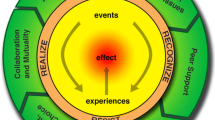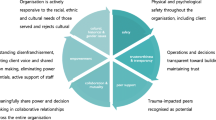Abstract
The de-adoption of evidence-based practices (EBPs) is a largely understudied topic. The present study examined factors related to the de-adoption of an EBP for students exposed to traumatic events in a large urban school district. Qualitative interviews conducted with school clinicians and district administrators 2 years after the district embarked on a large-scale rollout of the EBP distinguished between factors that impacted partial de-adoption after 1 year (phase 1) and complete de-adoption by the district after 2 years (phase 2). Phase 1 factors included organizational consistency, workforce stability, prior success, positive student outcomes, school- and district-level supports, innovation-setting fit, and innovation-related issues. Phase 2 factors included district-level leadership changes, financial and workforce instability, and shifting priorities. Study results suggest that sustainment-enhancing strategies should be included in the early stages of program implementation to most effectively adapt to school- and system-level changes.
Similar content being viewed by others
References
Aarons, G. A., Hurlburt, M., & Horwitz, S. M. C. (2011). Advancing a conceptual model of evidence-based practice implementation in public service sectors. Administration and Policy in Mental Health and Mental Health Services Research, 38(1), 4–23.
Adams, J. M. (2013, August 31, 2015). Schools promoting ‘trauma-informed’ teaching to reach troubled students. http://edsource.org/2013/schools-focus-on-trauma-informed-to-reach-troubled-students/51619.
Atkins, M. S., Graczyk, P. A., Frazier, S. L., & Abdul-Adil, J. (2003). Toward a new model for promoting urban children’s mental health: Accessible, effective, and sustainable school-based mental health services. School Psychology Review, 32(4), 503–514.
Becker, K. D., Bradshaw, C. P., Domitrovich, C., & Ialongo, N. S. (2013). Coaching teachers to improve implementation of the good behavior game. Administration and Policy in Mental Health and Mental Health Services Research, 40(6), 482–493.
Bernard, H. R. (2006). Research methods in anthropology: Qualitative and quantitative approaches (4th ed.). Lanham, MD: AltaMira Press.
Bond, G. R., Drake, R. E., McHugo, G. J., Peterson, A. E., Jones, A. M., & Williams, J. (2014). Long-term sustainability of evidence-based practices in community mental health agencies. Administration and Policy in Mental Health and Mental Health Services Research, 41(2), 228–236.
Chambers, D., Glasgow, R., & Stange, K. (2013). The dynamic sustainability framework: Addressing the paradox of sustainment amid ongoing change. Implementation Science, 8(1), 117–127.
Cole, S. F., O’Brien, J. G., Gadd, G., Ristuccia, J., Wallace, D. L., & Gregory, M. (2005). Helping traumatized children learn: Supportive school environments for children traumatized by family violence. Boston, MA: Massachusetts Advocates for Children.
Cooley-Quille, M., Boyd, R. C., Frantz, E., & Walsh, J. (2001). Emotional and behavioral impact of exposure to community violence in inner-city adolescents. Journal of Clinical Child Psychology, 30(2), 199–206.
Cooper, B. R., Bumbarger, B. K., & Moore, J. E. (2013). Sustaining evidence-based prevention programs: Correlates in a large-scale dissemination initiative. Prevention Science, 16(1), 145–157.
Datnow, A. (2005). The sustainability of comprehensive school reform models in changing district and state contexts. Educational Administration Quarterly, 41(1), 121–153.
Domitrovich, C. E., Bradshaw, C. P., Poduska, J. M., Hoagwood, K., Buckley, J. A., Olin, S., & Ialongo, N. S. (2008). Maximizing the implementation quality of evidence-based preventive interventions in schools: A conceptual framework. Advances in School Mental Health Promotion, 1(3), 6–27.
Fixsen, D., Blase, K., Metz, A., & Van Dyke, M. (2013). Statewide implementation of evidence-based programs. Exceptional Children, 79(2), 213–230.
Forman, S. G., Olin, S. S., Hoagwood, K. E., Crowe, M., & Saka, N. (2009). Evidence-based interventions in schools: Developers’ views of implementation barriers and facilitators. School Mental Health, 1(1), 26–36.
Fowler, P. J., Tompsett, C. J., Braciszewski, J. M., Jacques-Tiura, A. J., & Baltes, B. B. (2009). Community violence: A meta-analysis on the effect of exposure and mental health outcomes of children and adolescents. Development and Psychopathology, 21(1), 227–259.
Friend, S., Flattum, C. F., Simpson, D., Nederhoff, D. M., & Neumark-Sztainer, D. (2014). The researchers have left the building: What contributes to sustaining school-based interventions following the conclusion of formal research support? Journal of School Health, 84(5), 326–333.
Gamoran, A., Secada, W. G., & Marrett, C. B. (2000). The organizational context of teaching and learning. In M. Hallinan (Ed.), Handbook of the sociology of education (pp. 37–63). US: Springer.
Greenhalgh, T., Robert, G., MacFarland, F., Bate, P., & Kyriakidou, O. (2004). Diffusion of innovations in service organizations: Systematic review and recommendations. Milbank Quarterly, 82(4), 581–629.
Hoagwood, K., Olin, S. S., Kerker, B. D., Kratochwill, T. R., Crowe, M., & Saka, N. (2007). Empirically based school interventions targeted at academic and mental health functioning. Journal of Emotional and Behavioral Disorders, 15(2), 66–92.
Jaycox, L. H., Kataoka, S. H., Stein, B. D., Wong, M., & Langley, A. (2005). Responding to the needs of the community: A stepped care approach to implementing trauma-focused interventions in schools. Report on Emotional and Behavioral Disorders in Youth, 5(4), 85–88. (100–103).
Kataoka, S. H., Jaycox, L. H., Wong, M., Nadeem, E., Langley, A., Tang, L., & Stein, B. D. (2011). Effects on school outcomes in low-income minority youth: Preliminary findings from a community-partnered study of a school trauma intervention. Ethnicity and Disease, 21(3), 71.
Kataoka, S. H., Stein, B. D., Jaycox, L. H., Wong, M., Escudero, P., Tu, W., & Fink, A. (2003). A school-based mental health program for traumatized Latino immigrant children. Journal of the American Academy of Child and Adolescent Psychiatry, 42(3), 311–318.
Langley, A. K., Nadeem, E., Kataoka, S. H., Stein, B. D., & Jaycox, L. H. (2010). Evidence-based mental health programs in schools: Barriers and facilitators of successful implementation. School Mental Health, 2(3), 105–113.
Massatti, R. R., Sweeney, H. A., Panzano, P. C., & Roth, D. (2008). The de-adoption of innovative mental health practices (IMHP): Why organizations choose not to sustain an IMHP. Administration and Policy in Mental Health and Mental Health Services Research, 35(1–2), 50–65.
Muhr, T. (1998). Atlas Ti. Berlin: Scientific Software Development.
Nadeem, E., Jaycox, L., Kataoka, S. H., Langley, A. K., & Stein, B. D. (2011). Going to scale: Experiences implementing a school-based trauma intervention. School Psychology Review, 40(4), 549–568.
National Implementation Research Network. (2015). Learn implementation: Implementation drivers. Retrieved Sept 4, 2015. http://nirn.fpg.unc.edu/learn-implementation/implementation-drivers.
Ngo, V., Langley, A., Kataoka, S. H., Nadeem, E., Escudero, P., & Stein, B. D. (2008). Providing evidence-based practice to ethnically diverse youths: Examples from the Cognitive Behavioral Intervention for Trauma in Schools (CBITS) program. Journal of the American Academy of Child Adolescent Psychiatry, 47(8), 858–862.
Owens, J. S., Lyon, A. R., Brandt, N. E., Warner, C. M., Nadeem, E., Spiel, C., & Wagner, M. (2014). Implementation science in school mental health: Key constructs in a developing research agenda. School Mental Health, 6(2), 99–111.
Palinkas, L. A., Ell, K., Hansen, M., Cabassa, L., & Wells, A. (2011). Sustainability of collaborative care interventions in primary care settings. Journal of Social Work, 11(1), 99–117.
Palinkas, L. A., Weisz, J. R., Chorpita, B. F., Levine, B., Garland, A. F., Hoagwood, K. E., & Landsverk, J. (2013). Continued use of evidence-based treatments after a randomized controlled effectiveness trial: A qualitative study. Psychiatric Services, 64(11), 1110–1118.
Panzano, P. C., & Roth, D. (2006). The decision to adopt evidence-based and other innovative mental health practices: Risky business? Psychiatric Services, 57(8), 1153–1161.
Reinke, W. M., Herman, K. C., Darney, D., Pitchford, J., Becker, K., Domitrovich, C., & Ialongo, N. (2012). Using the classroom check-up model to support implementation of PATHS to PAX. Advances in School Mental Health Promotion, 5(3), 220–232.
Reinke, W. M., Stormont, M., Herman, K. C., Puri, R., & Goel, N. (2011). Supporting children’s mental health in schools: Teacher perceptions of needs, roles, and barriers. School Psychology Quarterly, 26(1), 1.
Scheirer, M. A., & Dearing, J. W. (2011). An agenda for research on the sustainability of public health programs. American Journal of Public Health, 101(11), 2059–2067.
Schwab-Stone, M., Chen, C., Greenberger, E., Silver, D., Lichtman, J., & Voyce, C. (1999). No safe haven II: The effects of violence exposure on urban youth. Journal of the American Academy of Child and Adolescent Psychiatry, 38(4), 359–367.
Schwartz, D., & Gorman, A. H. (2003). Community violence exposure and children’s academic functioning. Journal of Educational Psychology, 95(1), 163–173.
Stein, B. D., Jaycox, L. H., Kataoka, S. H., Wong, M., Tu, W., Elliott, M. N., & Fink, A. (2003). A mental health intervention for schoolchildren exposed to violence: A randomized controlled trial. JAMA, 290(5), 603–611.
Stein, B. D., Kataoka, S. H., Jaycox, L. H., Wong, M., Fink, A., Escudero, P., & Zaragoza, C. (2002). Theoretical basis and program design of a school-based mental health intervention for traumatized immigrant children: A collaborative research partnership. Journal of Behavioral Health Services and Research, 29(3), 318–326.
Stephan, S. H., Weist, M., Kataoka, S., Adelsheim, S., & Mills, C. (2007). Transformation of children’s mental health services: The role of school mental health. Psychiatric Services, 58(10), 1330–1338.
Stevens, J. E. (2012). Massachusetts, Washington State lead U.S. trauma-sensitive school movement. http://acestoohigh.com/2012/05/31/massachusetts-washington-state-lead-u-s-trauma-sensitive-school-movement/.
Stirman, S. W., Kimberly, J., Cook, N., Calloway, A., Castro, F., & Charns, M. (2012). The sustainability of new programs and innovations: A review of the empirical literature and recommendations for future research. Implementation Science, 7(1), 1–19.
Tibbits, M. K., Bumbarger, B. K., Kyler, S. J., & Perkins, D. F. (2010). Sustaining evidence-based interventions under real-world conditions: Results from a large-scale diffusion project. Prevention Science, 11(3), 252–262.
U.S. Department of Health and Human Services. (2003). New Freedom Commission on Mental Health: Achieving the Promise: Transforming Mental Health Care in America. Final Report. In DHHS (Ed.). Rockville, MD: Department of Health and Human Services.
Walker, D. W. (2008). A school-based mental health service model for youth exposed to disasters: Project Fleur-de-lis. The Prevention Researcher, 15(3), 11–13.
Zinzow, H. M., Ruggiero, K. J., Resnick, H., Hanson, R., Smith, D., Saunders, B., & Kilpatrick, D. (2009). Prevalence and mental health correlates of witnessed parental and community violence in a national sample of adolescents. Journal of Child Psychology and Psychiatry and Allied Disciplines, 50(4), 441–450.
Acknowledgments
This research project was supported by funding from the National Institute for Mental Health (5K01MH83694). We would like to thank the school district leadership and staff for their support and participation in this project, and Priscilla Petrosky, M.Ed., for her contribution to this manuscript.
Author information
Authors and Affiliations
Corresponding author
Rights and permissions
About this article
Cite this article
Nadeem, E., Ringle, V.A. De-adoption of an Evidence-Based Trauma Intervention in Schools: A Retrospective Report from an Urban School District. School Mental Health 8, 132–143 (2016). https://doi.org/10.1007/s12310-016-9179-y
Published:
Issue Date:
DOI: https://doi.org/10.1007/s12310-016-9179-y




